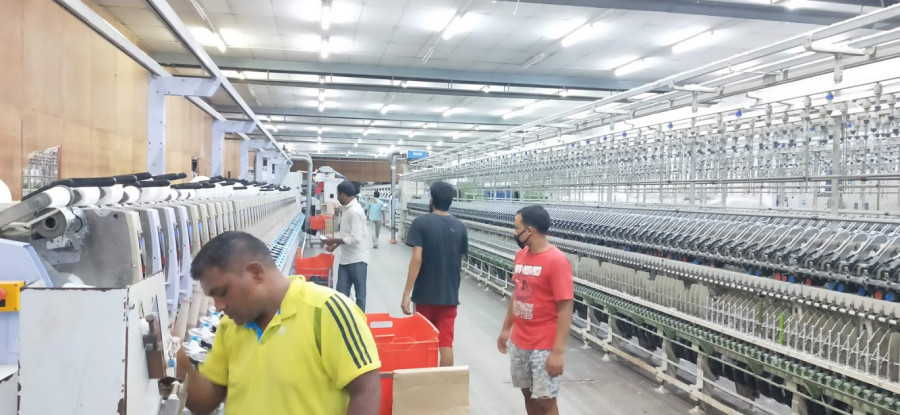Money
Factories forced to slash output due to erratic government policy amid pandemic
Most of the plants that have been forced to cut output are those producing cement, iron and steel, brick, tile and construction materials.
Madhav Dhungana
Shree Steels located in the Bhairahawa-Parasi Industrial Corridor has had to slash its steel output from 800 tonnes daily to 250 tonnes. Another factory, Panchakanya Steels, is operating at half its capacity, producing 300 tonnes daily instead of the usual 600 tonnes.
A large number of factories in western Nepal are running at reduced capacity due to restrictions imposed by the provincial governments to prevent virus transmissions even though the federal government lifted the lockdown last July.
Many manufacturing plants in Province 5 have slowed to below 40 percent of capacity, according to industrialists.
“There is no proper environment and proper policy of the government to operate the factories smoothly,” said Rajesh Agrawal, proprietor of Shree Steels. “Because of frequent policy changes, we are not sure what the government will do next, particularly in the industrial sector,” he said. “This shows there is no long-term vision for the sustainable growth of the industry.”
Agrawal said government policy had been fluctuating like the coronavirus caseload. And the inconsistent policy has worried the industrial sector, he said.
Agrawal, a central member of the Federation of Nepalese Chambers of Commerce and Industry, said that in India the government doesn’t make any decision that is not favourable to the industrial sector regardless of the coronavirus caseload.
“But in Nepal, different decisions are taken in each district, and this has been causing problems at every step.”
According to Nepal Rastra Bank’s half-yearly study report entitled Economic Activities Study Report 2019-20 released recently, factories are operating at only 40 percent of capacity.
The study, conducted between mid-July 2019 and mid-January 2020, shows that capacity utilisation was 60 percent in the corresponding period in the previous year. The study does not cover industrial capacity utilisation after Covid-19.
Factory owners say they have to face administrative hassles when bringing skilled workers from India and exporting their finished goods. Most of the plants that have been forced to cut output are those producing cement, iron and steel, brick, tile and construction materials.
When the government imposed a complete lockdown on March 24, all workers were sent home and the stay-home order continued for a long period. Even after it was lifted on July 21, restrictions continued.
Industrialists say that due to the prolonged lockdown and subsequent restrictions, demand for construction materials hit rock bottom. There was no demand even from the government’s small and mega projects.
Steel plants like Everest, Ambe, Laxmi, Siddha Laxmi, Goenka Steels, Shree Steels and Panchakanya in Rupandehi, Nawalparasi and Kapilvastu which have a combined annual production capacity of 1 million tonnes are operating at 40 percent of capacity.
There are 25 steel factories across the country with a total installed capacity of 3.5 million tonnes annually.
Among the 61 cement factories in Nepal, 11 in Rupandehi produce 9,800 tonnes daily, nine in Kapilvastu produce 6,000 tonnes daily, and four in Nawalparasi make 6,850 tonnes daily.
“Natural disasters like floods and district-wise constraints caused transportation problems and hindered output even though the government relaxed virus restrictions,” said Bidur Dhungana, general secretary of the Western Region Cement Producers Association.
“In Kathmandu, Pokhara, Palpa, Gulmi, Syangja and Tanahu, it was difficult to deliver cement to market as security personnel prevented free movement of vehicles,” said Dhungana.
“We cannot keep cement for a long time so we had to cut production as all transportation came to a grinding halt,” said Rishi Agrawal, vice president of the association.
“Since both government and private construction projects stopped, there were few buyers for our cement too,” he added. “So we slashed output by half.”
Asian Concerto, a newly-built factory costing Rs2 billion, used to produce 500 tonnes of bricks and tiles daily. Its output has plunged to below 30 percent of capacity currently.
Jagadamba Synthetics that used to produce 1,600 tonnes of plastic sacks daily has reduced its output by 40 percent.
“There is demand in the market, but we don’t have skilled manpower in the factories now,” said Ratan Acharya, manager of Jagadamba Synthetics. “After the workers went home, the factory’s production plummeted by 60 percent.”




 18.12°C Kathmandu
18.12°C Kathmandu













